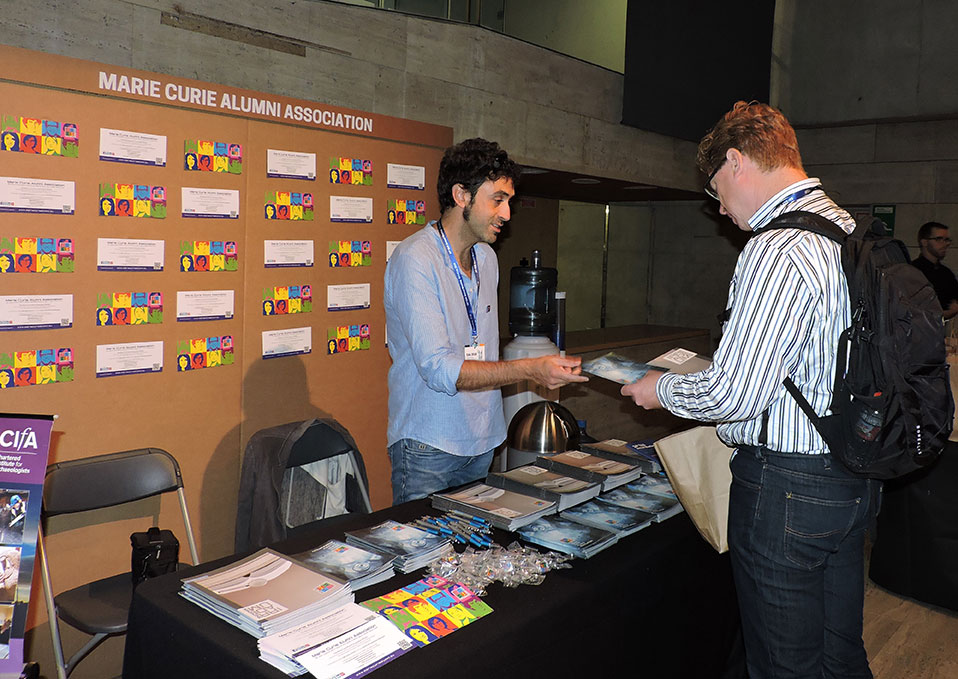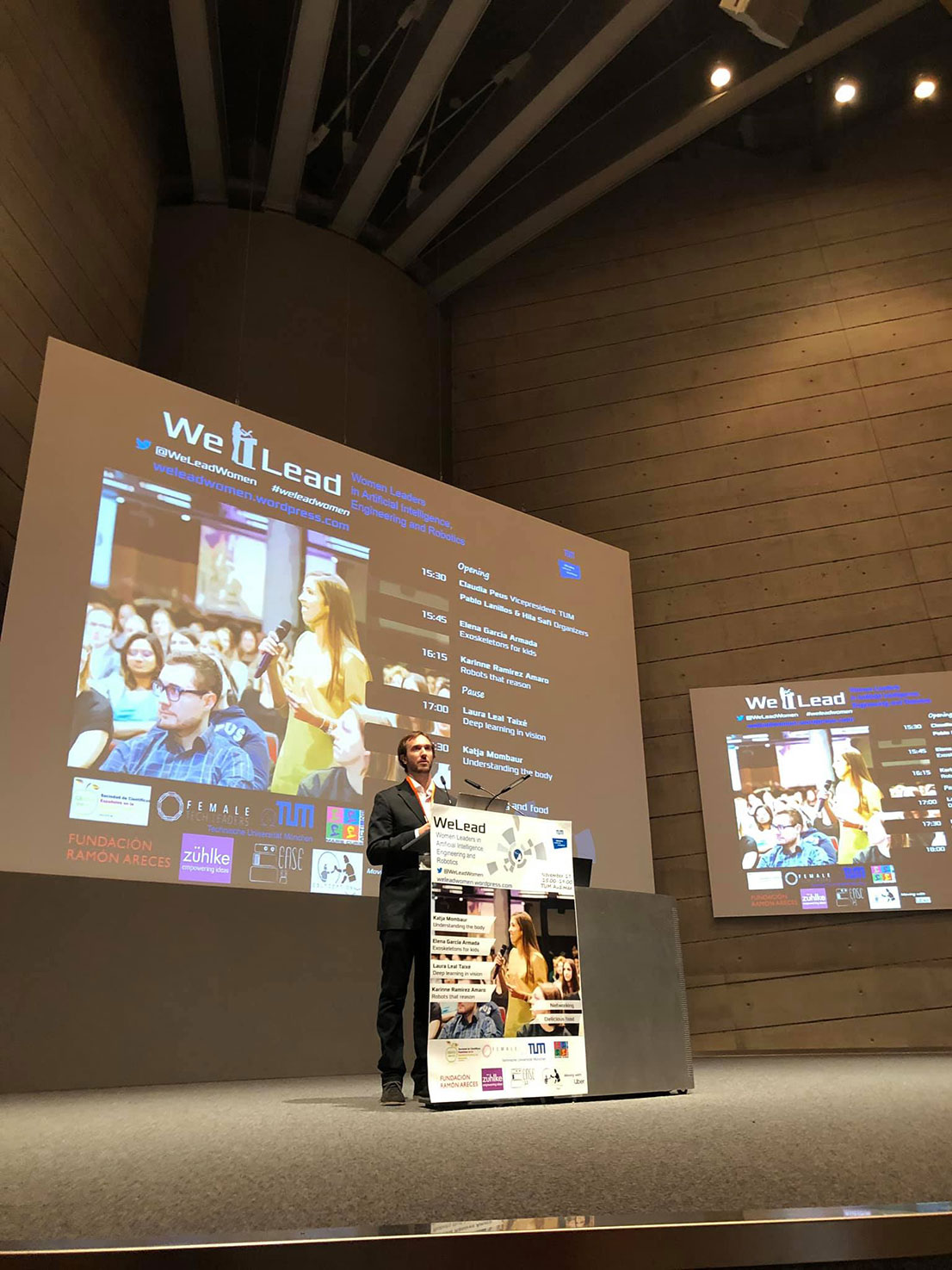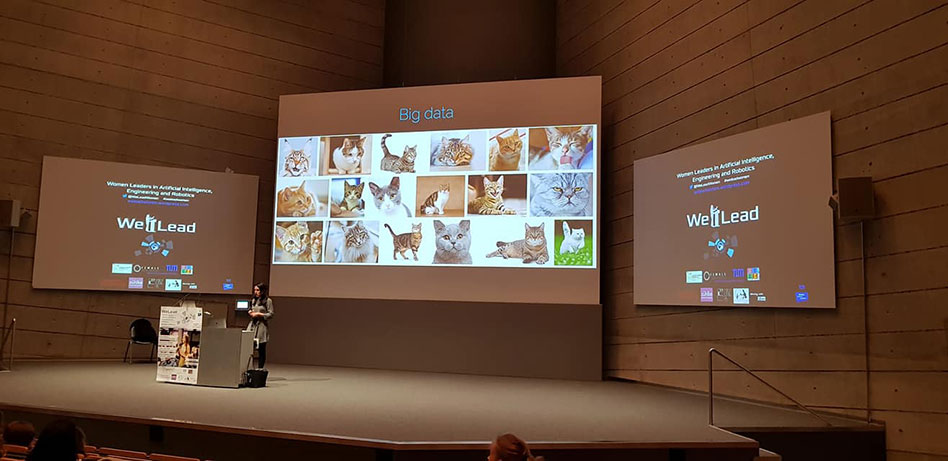Events - Newsletter January 2019
NEWSLETTER
MCAA AT THE 24TH ANNUAL MEETING OF THE EUROPEAN ASSOCIATION OF ARCHAEOLOGISTS

The Marie Curie Alumni Association’s Events and Network Working Group organised the session “Perspectives of the Marie Skłodowska-Curie Fellows in the Archaeological and Cultural Heritage Fields” at the Annual Meeting of the European Association of Archaeologists (EEA) 2018.
The EEA 2018 took place 5-8 September 2018 in Barcelona. Some 3 000 participants attended the event. The MCAA’s session, organised by Angela Bellia and Bettina Schulz Paulsson, was held on 7 September.

Participation at the EEA Annual Meeting in Barcelona aimed to reinforce the MCAA’s network within this particular community, which is significantly dynamic and influential in terms of intellectual ambition and practical relevance. This vibrant community is made up of MCAA alumni who are archaeologists and members of the EAA.
As such, the EEA Annual Meeting
proved to be a unique opportunity to share good practice and encourage discussion on past and on-going experiences in the field of archaeology. It served as a forum for promoting debate, research and the exchange of good practices on the quality of conservation, safeguarding, innovative reuse and enhancement of cultural heritage, and on contemporary interventions in the historical environment.
The MCAA panel at the EEA meeting highlighted how Marie Skłodowska-Curie Fellowships contribute to the development of the MSCA researchers and their future perspectives in the archaeological and cultural heritage fields. In addition, the session raised the issue with postdoctoral fellows stuck in temporary and insecure employment.
The chair of the Archaeology and Heritage Research Area Group, Helen Dawson, emphasised the aim of the group which is to bring together fellows working in or with an interest in archaeology and/ or cultural heritage. In February 2018, several group members met at the MCAA General Assembly in Leuven. The meeting was an opportunity to take stock and think about the future directions of the group.
The range of expertise as a select group of archaeology an heritage researchers places them in a unique position to comment and provide feedback on important issues, such as the European Year of Cultural Heritage 2018.
Bettina Schulz Paulsson shared her research experience related to the Career Restart Panel (CAR), a multidisciplinary panel of the MSCA-IF fellowships which provides financial support to individual researchers who want to resume research in Europe after a career break. At her host institution, she is receiving both the required specific training for her research topic and long-term academic career training. In addition, the focus is on hands-on training to prepare funding applications for research projects at national and EU level, competence on project management strategies and leadership for advancing collaborative work environments in the academic world.
As a result of his individual fellowship, Piero Gilento is working in Jordan, an area of great archaeological and architectural value. His contribution aimed to reflect on the practice to be adopted in terms of its contribution, not only for a better knowledge of the sites, but also for their conservation and enhancement. The view here is that cultural heritage can contribute to the development of small local communities.
Meanwhile, Angela Bellia is expanding her skills in the use of post-processing software and acoustic techniques based on computerised models. Her second MSCA-IF fellowship stresses her aspiration to develop new skills in digital heritage. These skills will be extremely useful for her return and reintegration into a long-term research position in Italy, a country that is well established in the fields of cultural and digital heritage studies.
As was the case last year, the E&N WG set up a booth at the conference venue to promote the MCAA’s activities. MCAA fellows were invited to promote MCAA to groups, companies, autonomous researchers, and political and research institutions.
Many MCAA archaeologists who visited the stand said they are planning to attend the 2019 EEA Annual Meeting, which will be held in Berna.
ANGELA BELLIA

The Bridging Science and Business working group organised the Networking for nerds webinar on 25 October. Here are the main outcomes.
ABOUT THE WEBINAR
The webinar was part of a series of webinars organised by the Bridging Science and Business working group (BSB WG). Looking for a job can be hard, particularly so if we are trying to navigate between the realms of academia and industry. Most jobs and other game-changing career opportunities are not advertised, and even if they are, there is usually a short-list of candidates already in mind.
So how can you find out about and access 90% of jobs and other opportunities that are hidden? In this webinar, the focus was on proven networking strategies and tactics to identify new opportunities. It also delved into how to locate decision- makers within organisations and how to solidify your reputation and brand in the minds of those who hire.
ABOUT THE SPEAKER: ALAINA G. LEVINE
Alaina G. Levine is an award-winning entrepreneur, STEM career consultant, science journalist, professional speaker and corporate comedian. Her first book, Networking for Nerds (Wiley, 2015), beat out Einstein (really!) for the honour of being named one of the Top 5 Books of 2015 by Physics Today Magazine.
As the president of Quantum Success Solutions, Levine is a prolific speaker and writer on career development and professional advancement for scientists and engineers. She has delivered over 700 speeches for clients in the US, Europe, Mexico, Canada, and Africa. She is also the author of more than 350 articles published in international publications such as Nature, Science, Scientific American, National Geographic News Watch, and IEEE Spectrum.
Levine has served as a career columnist for Physics Today and is a regular contributor to the American Physical Society’s APS News and ScienceCareers.org. She is also the author of two online courses for Oxford University Press on career development and entrepreneurship/ commercialisation, a consultant, speaker, and writer for the Lindau Nobel Laureate Meetings, and the event manager for an international conference on phononics.
GREAT ATTENDANCE
Some 60 people attended the webinar and there were many requests for information following the webinar. As such, it is now being considered whether to make the recording available to people for 10 EUR.
Upcoming webinars will explore topics such as team leadership for researchers, and harassment in the workplace – topics of growing importance for our members and followers.
A ‘PASSIONATE AND ENGAGING’ TALK
Levine delivered a passionate and engaging talk, covering a wide range of topics. She received a large number of questions, most of them showing the difficulty of researchers to establish professional and interpersonal connections.
Despite a few moments of technical difficulties, participants were very satisfied. The feedback received from participants was amazing! The vast majority considered the webinar very good to excellent as regards the presentation of the speaker and for the information provided. Many participants also asked that future webinars go deeper into other career development areas such as leadership, making a career plan, and managing projects with industrial partners.
As organisers, we are more than happy to look for professional speakers who will be able to discuss these topics.
As for the concerns and operational challenges of organising these webinars, there were three in particular:
- Time. Some attendees complained that 2pm was too early. This is understandable, but the fact is that we have attendees from all over the world, such as Australia and the United States – the two extremes. We would like to be as inclusive as we can and this is why we prefer early afternoons.
- Technical setup. For free webinars, we use YouTube. For paid webinars, we use gotowebinar. The former is certainly better because it has a simple interface and is very flexible. The latter is rather for a corporate environment and has an unappealing interface; it also requires two dry runs to test all the options as well as to optimise it. Unfortunately, for the moment, we must stick to it.
- We are always short of volunteers to help in setting up the event. For us, it’s a lot of work and it would be great to have more people helping.
OTHER WEBINAR OPPORTUNITIES
We have a series of monthly webinars (past free webinars can be found on a YouTube playlist here). We are excited about cooperating with Levine and it is possible that we will have more webinars conducted by this passionate and inspiring speaker. Another webinar took place on 30 November. It was conducted by Brenad Rowan from MERLIN on “the innovation journey from research results to product”. In addition, we plan another paid webinar on 23 January 2019 on “Effective leadership for successful research & innovation”.
ATTEND OUR WEBINARS!
We offer precious knowledge to our members mostly for free. During the webinars, participants have a unique opportunity to ask questions and engage in post-webinar communication with the trainer. And all of this, from the comfort of your home or office! When we have a professional trainer, we ask for a small fee to cover the expense.
PAVLO BAZILINSKYY
& MARCO MASIA

AUSTRIAN EU COUNCIL PRESIDENCY CONFERENCE ON IMPACT OF SOCIAL SCIENCES AND HUMANITIES FOR A EUROPEAN RESEARCH AGENDA
Asun Lopez Varela attended the Austrian EU Council Presidency Conference about the Impact of Social Sciences and Humanities for a European Research Agenda, in Vienna on 28-29 November.The panels responded to the questions about valuation narratives and theories on impact generation and methods for SSH, as well as the different forms of viewing ‘public value’ for SSH and artsbased research. Also discussed was SSH contribution to interdisciplinary projects driven by other disciplines (and vice versa). One question raised was how SSH can contribute to the new missions proposed by the European Commission for FP9?

The Austrian EU Council Presidency’s conference on SSH-Impact was organised by ZSI, the Centre for Social Innovation, on behalf of the Austrian Federal Ministry of Education, Science and Research (representing the Austrian EU Council Presidency in the field of RTI) and the European Commission.
As many as 350 participants from 36 countries took part. The conference responded to several strategic developments. The list includes:
- The Lamy-Report which notes that SSH can act as a driver for some missions of the next Horizon- Europe Framework
- Recommendations drawn up in the Mazzucato Report to maximise the impact through mission- oriented policies
- A paper prepared by the European Commission which highlights the high policy relevance of SSH research, and the integration
- of certain SSH disciplines and topics in other societal challenges
- The European Parliament’s move towards a broader and clearer definition of impact by raising awareness on long-term results
- The Council of Europe conclusion that a focus on impact can advance solutions to social challenges.
The conference was divided into three main panels, each corresponding to a theme:
- Valuation pathways
- Structures and policies
- Assessing impact.
Also discussed were the support- structures and policies to assist the integration of SSH in Horizon-Europe framework. The questions raised: How can ‘value for society’ be better tackled, traced, created, captured and exploited by transformative SSH approaches? Which support structures and mechanisms are needed for this? How can the use and impact of SSH and arts-based research to the benefit of a transformative and mission-oriented European research and innovation agenda be better traced, assessed and measured?
As regards new ways of tracing and assessing impact in knowledge production, knowledge dissemination and knowledge usage to increase relevance, outcome and impact in SSH, the following question was tabled: which assessment and measurement methodologies can be used to measure the impact of SSH research contributions at different levels (e.g. scientific impact; policy and structural impact; societal impact)?
The purpose of the conference focused on valuation and impact contributions of SSH research to the next European research framework programme ‘Horizon Europe’ (2021-2027) which will be organised in three pillars: Open Science, Global Challenges, and Open Innovation. It focused on Pillar 2 of Horizon Europe: ‘Global Challenges and Industrial Competitiveness’ and how SSH can contribute to it.
The Global Challenges-Pillar is structured along five thematic clusters. These five thematic clusters served as structure for parallel sessions on “Health”, “Inclusive and Secure Society”, “Digital and Industry”, “Climate, Energy and Mobility” and “Food and natural resources”.
The second day of the conference delved deeper into discussions about how SSH-contributions to transformative research agendas could be implemented in day-to-day activities.

ASUN LOPEZ VARELA
RESEARCHERS AND STUDENTS OF MUNICH SUPPORT WOMEN IN TECH

The WeLead international symposium was celebrated on 17 November 2018 at the Technical University of Munich (TUM), in Germany, with more than 200 attendees. It brought together top researchers and leaders from Germany and Spain who were eager to show the excellent work that is being done by female researchers in the fields of artificial intelligence, robotics and engineering.
“We want to show the new and old generations that the glass ceiling can in fact be broken”, said Pablo Lanillos, a doctor in AI and robotics and one of the main organisers of the event, under the MSCA Selfception project. Only 20 % of directors or full professors are women in Europe. The “glass ceiling” issue is a major problem that needs to be overcome in order to achieve gender labour equality. In the fields of engineering, these figures are worrying. A study conducted in England in 2016 showed that less than 10 % of the researchers in tech were women.
This event was created as a result of Munich city’s response to this imbalance. Several research associations and voluntaries joined forces to create the concept of WeLead, an initiative which aims to be the first of many that will be organised every year in a different German city. Together, they want to show how women are shaping the future of technology.
Claudia Peus, vice president of TUM opened the event. She said: “We must join forces to make women in technical fields visible”. Pablo Lanillos from the MSCA Selfception project, and Hila Safi from Female Tech Leaders, conducted the symposium. By pointing out some discouraging comments to which women in technical fields were exposed to last year, they showed there is much work to be done before gender balance is achieved.
Elena García Armada, from the Spanish National Research Council and co-founder of Marsi Bionics, presented EXOTrainer, an exoskeleton optimised for active gait rehabilitation of children suffering from neuromuscular disease.
In turn, Karinne Ramírez Amaro, a researcher at the Institute for Cognitive Systems at TUM, shared her personal experience during her studies in México regarding the number of women there. She also introduced her project Everyday Activity Science and Engineering (EASE), which aims to apply AI methods to robotics in order to generate semantic models designed to infer human activities.




What is more, Laura Leal Taixé, professor leader of the Dynamic Vision and Learning Group at TUM, gave some insights into Deep Learning and explained the main challenges it is facing including data bias and the need of quality data.
Finally, Katja Mombaur, professor at the Ruprecht-Karls University of Heidelberg and head of the Optimization, Robotics and Biomechanics Chair spoke about the importance of understanding the fundamental principles of human movement for the development and control of human-centred robots.
The event concluded with networking opportunities. Attendees exchanged ideas and met those who promoted and supported this inspiring event, including scientists, engineers, gender equality experts, universities and companies. Moreover, they were able to obtain information about their future career in IT companies, such as Zühlke, or at universities, such as the University of Bremen. They were also given free vouchers from Uber.
Furthermore participants were asked to propose activities or measures to achieve equal access and promotion opportunities in the field of artificial intelligence, robotics and engineering. Everybody agreed that students at all levels of education, especially primary school children, should be addressed. Below is a summary of some of the proposals:
- Organising educational activities at schools to bring technical knowledge to children, especially those between the ages of 8 and 12.
- Outreach programmes in which tech companies in Munich become involved in educational activities that motivate students, especially young girls, to help them focus on their career in technological fields.
- Promoting measures to conciliate family and technical careers.
- Organising events to overcome gender bias in the technological field, in which gender-neutral language is promoted.
- Gender balance in conference (50 % male, 50 % women).
- Changing the image of a scientist by highlighting the contributions of women to science throughout history.
From WeLead we would like to give special thanks to Female Tech Leaders, the Technical University of Munich, especially the Department of Electrical and Computer Engineering and the Institute for Cognitive Systems, the EASE Interdisciplinary Research Center in Bremen, Zühlke Engineering GmbH, the Society ofSpanish Researchers in Germany (CERFA), the MSCA Alumni Association and the speakers for their strong support in the event and their help in achieving gender balance in Robotics, Computer Science and Engineering.
MORE INFORMATION CAN BE FOUND AT:
WeLead https://weleadwomen.wordpress.com
Twitter @WeLeadWomen
Facebook https://www.facebook.com/events/254472615255292/
CERFA (@SociedadCERFA, www.cerfa.de)
Female Tech Leaders Munich (@FemaleTechLeaders,
https://www.femaletechleaders.org/)
TERESA RINCÓN DOMÍNGUEZ
